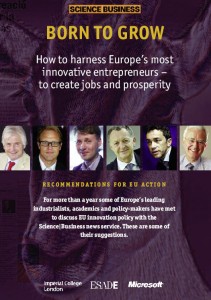I just finished reading an interesting report entitled “Born to Grow – How to Harness Europe’s most innovative entrepreneurs”
Nothing really new but a very good synthesis of recommendations and I emphasize in bold the ones I consider really critical:
Even better are the features of a high-growth entrepreneur (page 11):
Originality. The greatest entrepreneurs have a better idea: a novel product, service or process that fills a need.
Adventurousness. In the generally risk-averse culture of Europe, it’s rare to find an entrepreneur with the will to quit a cushy job and gamble the future on an idea.
Dedication. Rigor and determination are hotwired into the best entrepreneurs – and that comes naturally to many scientists and engineers.
Ambition. International business success comes easier if the entrepreneur’s plan is global from the
start.
Humility. Perhaps the rarest, but most important, trait in a high-growth entrepreneur is the ability to recognise one’s personal limitations – and seek help from others, rather than try to
run the whole show.
In the nurture of a high-growth entrepreneur:
A thriving ecosystem. Businesses don’t grow in vacuums; they need networks of suppliers, researchers and customers.
Financial backing. It takes money for a start-up to grow from minnow to whale; and deeppocketed, deeply engaged investors are critically important.
A big, open market. A company needs plenty of room for manoeuvre – and some of the brightest entrepreneurial stars have profited when old, regulated markets started to open up.
Big brothers. For many start-ups, it helps to grow in the shelter of big corporations that create their
own ecosystems. Examples: Risto Siilasmaa, whose F-Secure antivirus company thrived in the 3,500-company world created around mobilephone giant Nokia; and Peter Bang and Jesper Balser, whose Danish business-process software firm Navision grew up in Microsoft’s programming environment – and was later bought by it.

